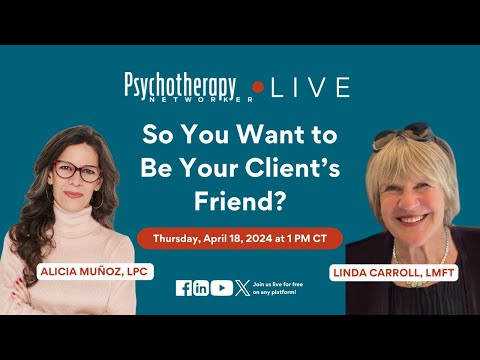Jeannette, my first therapist, is staring at me—and has been for longer than feels comfortable. I reach into my purse, pull out my Marlboros and a yellow Bic. “Is it okay to smoke?” It’s 1980, after all. She nods silently and passes me a mosaic ashtray. I light up, inhale, and try not to fidget. The room is still. I shift in the chair, which feels enormous—like my father’s recliner when I was a kid. The leather swallows me.
I fixate on the tissue box. I’m not crying, but I’m already plotting my route to it. How many people sit here and sob every day? Does she make weekly tissue-box purchases? Why isn’t she talking? I glance at the clock. 4:07 p.m. I look at her. Perfectly composed, like a portrait that hasn’t quite dried. No expression, no smile, no head tilt. Hair in a ponytail. Giant tortoiseshell glasses. Her beige cardigan, plaid skirt, and practical pumps match her uptight demeanor. She looks like a school librarian moonlighting as a minor court judge.
We’ve been sitting in silence for what feels like an hour, surrounded by books by all the psychological heavyweights—Jung, Piaget, Freud, Rogers—all staring down like they’re grading me. I wonder if I’m failing. I’ve read most of them already, imagining a future where I’m the one sitting in the other chair—her chair.
“I guess you’re waiting for me to talk,” I say. No reply. Just more quiet staring. God, this is awkward. Is she even allowed to talk? Is she writing notes in her head? Does she think I’m already too far gone? Do I start with my boyfriend or my mom? I glance at the door. It feels both too far away and dangerously close. I imagine standing up, grabbing my purse, mumbling, “This isn’t for me,” and disappearing down the stairs.
But I stay. My face is hot. My heart pounds. A familiar panic rises—the feeling that maybe I’m too much, too messy, too broken to be helped. What if she’s already given up on me? I’ve barely said anything, and already I’m unraveling. A sob ambushes me. Tears mix with mascara and electric blue eyeshadow. I reach for the tissue box. Still, she says nothing. I want her to rescue me. To say something. But she doesn’t. And something in me snaps. I’m angry. How dare she sit there like some blank screen while I’m falling apart? I’m not a puzzle for her to simply contemplate. I’m a person—crying, reaching—and she can’t even offer me a nod? I glare at her through the smoke. I want to ask, “Do you enjoy this? Watching people squirm until they break open?”
After a few months, I begin to like her—and the therapy starts to work. We meet every week for a year. As I talk things through out loud, my confidence grows. With her quiet nods and occasional questions when I get stuck, I start making my own connections. I can see myself in this chair, figuring out my life, for a long time. Then one day, Jeannette says, “I think you’re done.” I’m stunned—and furious. I beg her to let me stay. “Please don’t end it yet. I’m not ready to be done.” She gives me a quiet smile. “You’re ready,” she says. In truth, I never wanted it to end. And maybe she’s sensed my growing dependence. That’s a thing in the field, at this time: “don’t let your clients rely on you too much.”
Time moved on. Fifteen years passed. I got married, had children, and earned my MSW. I started out at an agency, then found a private practice that gave me the flexibility to see clients while raising a family. Life was busy, and I didn’t give myself time to reflect on my own happiness. My husband and I spun around each other, both of us busy co-parenting and volunteering at our Synagogue, but rarely did we find time for each other. I felt a steady undercurrent of tension and loneliness. In spite of it all, I kept going—packing lunches, carpooling, managing a household—afraid to look at the truth, which was that I was miserable. I’d chosen a partner who couldn’t receive my love, rejected gifts, and was constantly angry about money. Over the years, I’d lost myself while taking care of everyone else. Then one day, putting on makeup, I stopped—really stopped—and looked in the mirror. “I can’t do this for another 40 years,” I said out loud. That was the moment I knew I needed someone again—a therapist—to listen to me.
Claire’s office is in a small basement that feels more like someone’s den. I sit on a white rattan sofa with my legs pulled under me, a blue crocheted pillow in my lap. Soft lighting and plants surround me.
“What brings you to therapy?” she asks.
“I’m not happy in my marriage, and I’m terrified of what that might mean. I seem to pick the wrong men. I don’t know why I keep doing this.”
She gives me a small, knowing smile. “You keep choosing people who can’t meet you not because you’re broken, but because that’s what you’ve known. But patterns aren’t permanent.”
Immediately, I feel connection and warmth—like I’m home, at least for now.
Claire’s in in her early 70s. She’s got short white hair and wears jeans and a flannel shirt. Her casual approach is a marked departure from my first therapist. Over the course of working together, she offers me feedback and advice when I ask for it, and sometimes even when I don’t. She’s direct and interacts with me conversationally. We maintain an easy back and forth that helps me get clear about my marriage. She fully supports me in the face of the terrifying decision to get a divorce and my guilt about my children.
By the time she retires the following year, I’m navigating single motherhood while learning to hold my own therapy clients through their major life changes. Although I don’t return to therapy for several years, I often think of Claire and what she might say, especially as I begin to date.
After two years of online dating that never went beyond the first date, my parents introduced me to the son of their new friends. We saw each other for over a year and things started to get serious between us. This time, I wanted to be sure I was making the right choice before a big romantic commitment. I wanted a sounding board. This time, I found Phillip.
As a therapist, Phillip is kind and fully present. We meet weekly in early spring on Tuesday mornings at 9 a.m. His office is in the country, and I enjoy the drive there as I pass old farms outlined with century-old stone walls. Phillip’s consulting room is modern and comfortable, with a long sofa and several chairs arranged around a rectangular coffee table. Past therapists had felt hierarchical, but Phillip’s approach is truly collaborative. He interacts with me as a client but also respects me as a colleague.
On Tuesday, September 11, 2001, I pull into a parking spot outside his office just as the news from New York broke over my radio. Planes are crashing into the World Trade Center. As I step out of the car, I see him waiting for me in the doorway of his office, a big smile on his face.
“Something bad just happened,” I stammer. A moment later, his wife joins us and confirms what I’ve just heard. We huddle together and cry.
We hold the weight of a changed world in our bodies as we part quietly. They reenter their house, and I get back in my car, drive home, and cancel my own therapy sessions. The next day, I begin seeing clients again, knowing they need someone who can remain steady and present with them through their confusion and grief.
Several weeks later, Philip and I have our last session. He’s shown me what it looks like to be fully present alongside whatever role we inhabit. We both agree that I’m done. And this time, I’m ready for the therapy to end.
In December, the man my parents had introduced me to, who’ d become my boyfriend, proposed, and we married soon after. By then, I’d gathered enough experience to understand what truly matters in my life—and what matters as a therapist for my clients.
I think about all the chairs I’ve sat in over the years, each one shaping the therapist I’ve become. Jeannette taught me how to sit in discomfort and let emotions rise. Claire taught me that warmth and wisdom can coexist—and that it’s okay to laugh through pain. Phillip taught me that presence can connect people in crisis, even more sometimes than words.
What I didn’t know then—but realize now—is that emotional availability isn’t the same thing as emotional connection. Reliability isn’t intimacy. And silence, the kind that once made me angry, can be a gift. It’s not usually indifference; often, it’s space. Space to think, feel, and be heard.
The truth is, no therapist ever gave me definitive answers—but each one helped me ask better questions.
Susan P. Epstein
Susan P. Epstein, LCSW, is a psychotherapist and writer in private practice in Connecticut. With over four decades of clinical experience, she writes about the intersection of therapy, life, and human connection. She can be reached at susan.epstein.lcsw@gmail.com.













